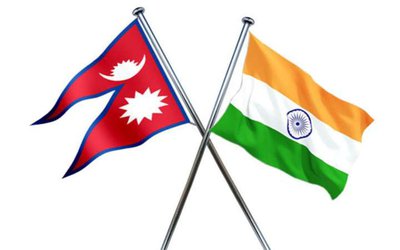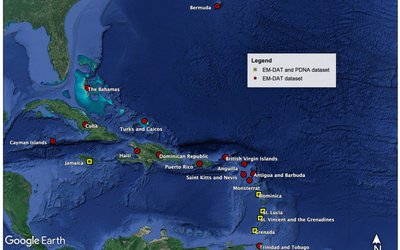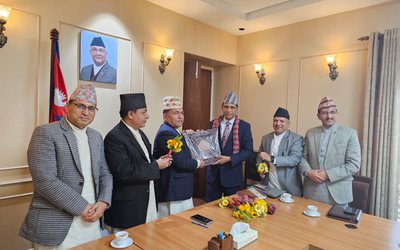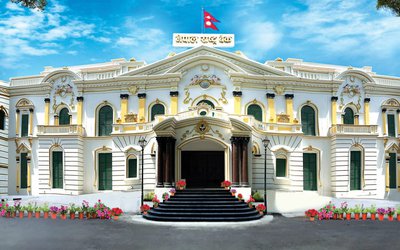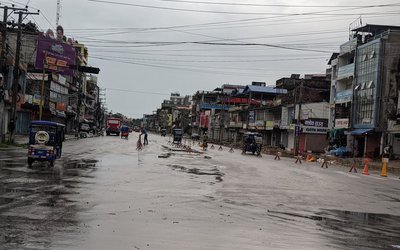
Recent two articles named 'Remembering our Kings', and 'Forest Finance from CoP26'posted on https://www.spotlightnepal.com/inspired to share 2010 initiatives in introducing Ecosystem-based Adaptation (EbA) in Nepal at a time of more people focusing on community-based adaptation (CbA). Preparation and approval of the National Adaptation Programme of Action (NAPA) in September 2010encouraged Nepal's climate change focal point, then Ministry of Environment, to take-up a single agenda to access fundings for NAPA-prioritised adaptation programmes.
During UNFCCC CoP16 in Cancun in early December 2010, Nepal discussed with UNDP and UNEP representatives for technical support in implementing NAPA. UNDP was encouraged to support in developing proposal for GLOF project taking note of its experience in Bhutan, and UNEP – the UN Environment – for EbA project based on its comparative advantage in promoting nature-based solutions, to access Least Developed Country Fund (LDCF) operated by the Global Environment Facility (GEF). CoP7 decided to establish LDCF, as a dedicated fund for only LDCs with equal approach, to effectively implement Article 4.9 of the Climate Change Convention.Both UNDP and UNEP are the GEF Implementing Agencies (IAs) and LDC Fund can be accessed only through GEF IAs. Two projects – 'rural', and urban EbA projects –secured funding from LDCF, and learning in securing funds of these projects isshared here.
In May 2011, the Government invited UNEP to support Nepal in accessing LDCF and UNEP submitted a PIF (Project Identification Form) for the project named 'catalysing EbA for resilient ecosystems and rural livelihoods in degraded forests and rangelands of Nepal'(rural EbA project) as a first formal document to the GEF Secretariat to secure funding.Endorsement of PIF indicates approval of concept and guarantees for funding the project.
Unfortunately, Nepal's PIF of an EbA project was rejected by the GEF Secretariat on 16 September 2011. The CEO-signed letter mentioned 'the Secretariat has decided not to support this request …' and 'I would advise you not to pursue further development of the PIF'. If the Secretariat and reviewers are not satisfied, there is a practice to ask for additional information, but Nepal's project concept was 'rejected'. The prerogative right of a sovereign country to develop the need-based and NAPA-prioritised project was challenged by the 'Fund operator'. It was really a 'sock' in Nepal's effort tointernalise nature-based solutions as long-term measures to cope with climate change impacts.
In November 2011, I had the opportunity to raise it in LDC preparatory meeting organised for CoP17 in Durban, South Africa and it opened issues on 'services provided and received'. A meeting was organised between Minister for Environment, Mr. Hem Raj Tated and the GEF CEO to discuss this 'PIF rejection issue'. Finally, two professionals Ms. Boni (Bonizella Biagini)from GEF Secretariat and Ms. Ermira Fida from UNEP proposed a mid-way, and we agreed to revive this project after six months.
The Project name was slightly changed to 'catalysing ecosystem restoration for climate resilient natural capital and rural livelihoods in degraded forests and rangelands of Nepal' and itsPIF was submitted to GEF Secretariat on 9 November 2012, and its Project Preparation Grant (PPG) was approved on 27 March 2013 after satisfaction from additional information asked by the GEF. A full-sized project was developed and submitted to GEF Secretariat on 21 July 2015. The GEF CEO & chairperson approved project for implementation on 11 August 2015 (https://assembly.thegef. org/project/catalysing-ecosystem-restoration-climate-resilient-natural-capital-and-rural-livelihoods)(within 3 weeks).Few months are required to prepare for project implementation which may be related to agreement, designating national project director, formation of Steering Committee, budget and account, staff recruitment, and office establishment as a part of host country arrangement. The Project Document mentioned to commence in September 2015, and technical completion by September 2018.
For nearly 3 years, two forestry officials in the then Ministry of Population and Environment (MoPE), in their capacities as the Secretary and Chief of the Climate Change Management Division (CCMD), delayed 'preparatory works' to implement this Project 'without any practical reasons'. Country faced the 'cost of inaction'. In February 2018, MoPE was dissolved, and the Ministry of Forests and Soil Conservation was renamed as the Ministry of Forests and Environment (MoFE). After 27 years, Government returned to institutional provision of 1991 as MoFE was established at that time and was later dissolved.
Close to the technical completion date (September 2018), the Project Cooperation Agreement (PCA) of this project was signed on 25 May 2018. Inception workshop of this Project was organised on 11 March 2019(https://www. spotlightnepal.com/2019/03/11/environmnet-and-development-need-go-side-side-minister-basnet/). The Project completion date might be extended beyond 2022. Delay of project implementation due to Covid pandemic is natural. Good news – the Project activities are on the ground after nearly a decade of 'conceptualisation'.
This 'rural' EbA Project is under implementation in 10 Local levels, covering 18 wards of Achham,Salyan and Dolakha. The Project focuses its activities in developing local and national institutional capacity, strengthening of policy and strategy (integrating EbA into existing and new policies and strategies), and demonstrating interventions to increase adaptive capacity to climate change and restore natural capital. Over 60 percent of the total budget may be spent for demonstration interventions. This Project is expected to bring a new dimension in clarifying EbA, CbA and normal development works in three-tiers of existing governance system,showing concrete results of nature-based solutions, further realising importance of ecosystem approach, and developing country capacity on EbA.
Realising the importance of EbA in coping with climate change impacts in urban areas as well, an urban EbA project was conceptualised in 2013,and Kathmandu Valley Development Authority (KVDA) took initiative in developing this Project. After designating UNEP as the GEF IA, PIF was prepared for a project on 'EbA for climate-resilient development in the Kathmandu Valley' which was endorsed by MoF in November 2014 and GEF received its PIF on 2 December 2014. Apledge-based LDCF faced fund shortage for few years. The GEF Secretariat approved project concept on 29 March 2017, and PPG to develop a full-size project. MoF submitted the full-sized project to GEF Secretariat in September 2018 and Project was approved for implementation on 1 August 2019 (https://www.thegef.org/projects-operations/projects/8009). This 4-year project was planned to commence in 2019 and complete by 2022. Its preparatory work also took nearly a year and Covid-19 further delayed its implementation.
After two years of approval for project implementation, KVDA organized its Inception Workshop on 30 November 2021 (https://www.spotlightnepal.com/2021/12/16/launching-urban-eba-project/). Dedicated to internalising EbA in the Kathmandu Valley, the Project will implement activities to mainstream EbA into development planning, generate knowledge and raise awareness on EbA, and establish climate-resilient communities through EbA interventions. Nearly 80 percent of the total budget may be used in demonstration interventions to decrease vulnerabilities of communities to climate-induced impacts of flooding, landslides and droughts in the Valley.
Both 'rural' and urban EbA projects have major focus on 'actions on the ground' to increase water availability and resilience of livelihood activities;decrease climate vulnerability; restore & rehabilitate forest ecosystems, including wetlands; reduce climate-induced disasters, and establish urban green spaces and parks. Although target areas are of rural and urban nature, both projects will contribute to develop country capacity by: (i) developing 'core' human resources; (ii) integrating EbA into existing and new policies and strategies (applicable for both urban and rural areas); and (iii) generating and sharing knowledge & good practices through demonstration activities. Nepal may be the only country securing LDCF for EbA projects to cope with rural and urban climate change impacts.
Knowledge generated and learning of a project provides opportunities for change in next one. Experiences of NAPA preparation process provided a basis to change the fund flow mechanism while implementing Nepal Climate Change Support Programme. In urban EbA Project, adoption of national recruitment process, and dedicated Project Finance Officer (KVDA staff)can be considered a new approach. It will likely help intaking this Project as an integral part of the KVDA. This will likely develop again the 'country capacity' at least on finance management and previous practice of 'handover' will gradually change. Let us hope it will work smoothly.
After completion of these twoproject activities, EbA advocates will have opportunities to further understand 'what worked and what did not', 'intentions, responsibilities and realities', and 'cost of inaction or delay action'; document 'bottlenecks'; share project operational level lessons and fund-flow mechanisms in three-tiers of governance; and further promote activities to integrate EbA into national to local governance systems. The Project will also inform time required and/or taken right from project formulation to completion of implementation, along with effectiveness of interventions.

Batu Uprety
Former Joint-Secretary and Chief of Climate Change Management Division, Ministry of Environment (then), and former Team Leader, National Adaptation Plan (NAP) formulation process. E-mail: upretybk@gmail.com
- Decadal Experience In Preparing The NDC
- Mar 03, 2025
- Over Five Decades Of Concern On Air Pollution
- Jan 16, 2025
- Damaging The Functional EIA Track
- Dec 22, 2024
- Baku CoP29 Outcomes And Nepal's Initiatives
- Nov 26, 2024
- Recalling the Initiatives for Baku Climate Conference
- Oct 24, 2024
